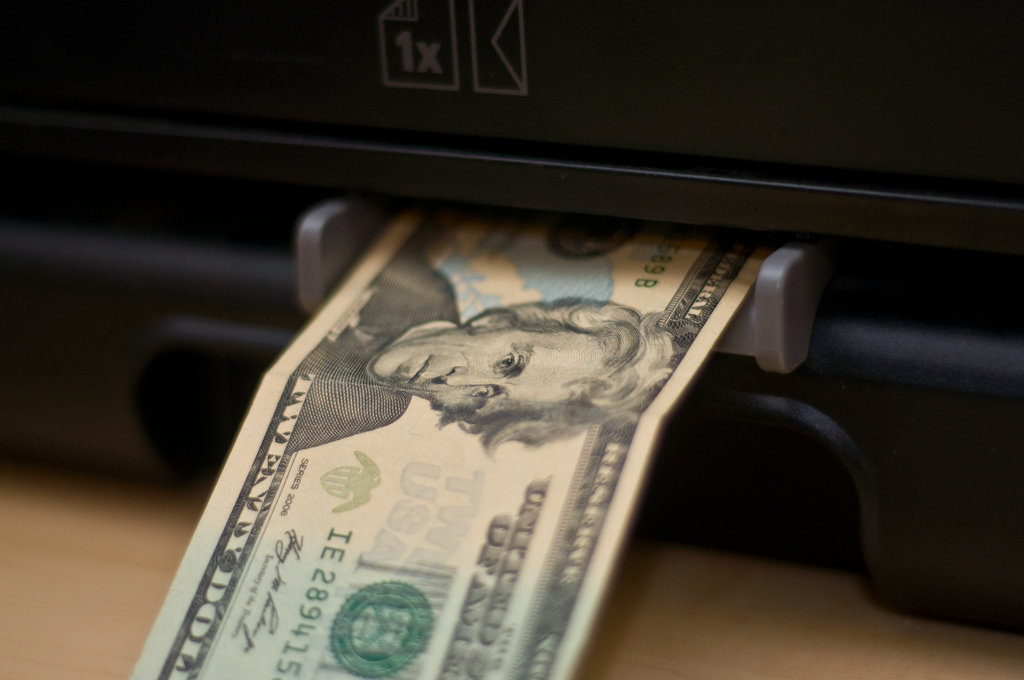Quantitative Easing (QE) - Good or Bad Thing?
Guest . 9 years ago
bernanke
central bank
finance
investment
large scale asset purchases
monetary policy
news

Share this post
Subscribe to our newsletter
Over the past few years, Quantitative easing (QE), the colloquial name for Large Scale Asset Purchases (LSAP) has been making rounds in the central banking world. As well as being the centre of wide range speculation, market participants are unsure about the future benefits and costs associated with this unconventional monetary policy. QE involves the Central Bank buying longer-term government…
Over the past few years, Quantitative easing (QE), the colloquial name for Large Scale Asset Purchases (LSAP) has been making rounds in the central banking world. As well as being the centre of wide range speculation, market participants are unsure about the future benefits and costs associated with this unconventional monetary policy.
QE involves the Central Bank buying longer-term government bonds from market participants thereby injecting new money into the economy. This pushes up the price of bonds and drives down the market interest rate on the bonds. Central banks hope that the low rates induce companies to borrow, as long-term interest rates are low and consumers are lured to take on longer-term debt such as mortgages and auto-loans. Also, investors flush with cash, then go and bid up other prices such as stocks, real estate and even farmland. This helps in increasing the value of those assets making consumers feel good as their balance sheet is artificially repaired; encouraging them to spend more. This is known as the wealth effect. In essence, quantitative easing is designed to unleash animal spirits in the economy and spur risk taking.
The Bank of Japan (BoJ), the Japanese central bank, has gone a step further and is intervening in other asset classes such as Real Estate Investment Trusts (REITs) and corporate bonds. This form of QE is called qualitative and quantitative easing (QQE.)
Unintended Consequences
As with most economic policies, unintended consequences abound. Cheap money seems to have found its way into the most dangerous parts of the credit and bond markets. Recently, Italian, Irish, Portuguese, Spanish and even Greek junk bond yields dropped to all-time lows despite the weak economic fundamentals. The drop was in part orchestrated by Draghi’s jawbone of the debt markets in June of 2012. Irish bonds now trade a few basis points (1 basis point = 0.01%) under much safer gilts (British government bonds.) High-yield bonds, otherwise known as junk bonds, issued by very risky companies have become devoid of yield and are trading at all-time narrow spreads to US Treasuries. This development has caught the attention of ex-Fed governor Jeremy Stein who in a St. Louis Fed lecture advocated for the central bank to move on interest rates in order to rein in the speculative excesses in the junk bond instead of relying on macro-prudential regulation. The excesses are already leading to signs of financial instability market agents are taking ever more risk in order to generate returns in a desolate world. The much anticipated capital expenditure in the real economy doesn’t seem to be happening as banks find it more profitable to speculate in asset markets than lend to much riskier business ventures. The major players in the junk bond market tend to be institutional funds holding pensions, trusts and foundations capital; a spike in yields remotely similar to that seen in the summer of 2013 would inflict tremendous capital losses on balance sheets which could be a reverse wealth effect across the economy.
Rise in Property Values
High-end real estate in places such as Belgravia in London have been bid up by international investors from various parts of the world. This has understandably created social tension as locals have been priced out of their domestic housing market. The term “Generation rent” has crept into the lexicon as a result. In the Japanese case, prime real estate in the famous Ginza shopping district in Tokyo have seen a bump in their values despite the nationwide collapse in housing prices since the housing bubble popped in 1989.
Global Equity Markets at All-Time-Highs
Stock markets of the US and even the UK are at all-time highs despite Main Street’s challenges. Corporate executives, wanting to keep their jobs and seeing a chance for financial engineering, have resorted to cheap debt finance, splurging capital on buybacks in order to appease shareholders. Despite these seemingly negative side-effects of QE, the recent rise in shareholder activism is a refreshing sign. Activists, looking to make returns for their investors are targeting companies in need of restructuring and helping to cut costs, improve operational and capital efficiency while generating returns for their investors. Unfortunately, the scale of activism is rather limited and may not have significant macroeconomic benefits.
Notable investors such as distressed debt investor, Wilbur Ross, have been coming out against QE and its unintended consequences. David Einhorn in an interview with the Economist magazine talks about potential costs to the real economy as shown below.
May Prove to be Harmful
When all is said and done, the negatives and the repercussions of an uncertain exit by central banks may prove to be harmful to the economy as asset prices collapse and interest rates mean-revert. In effect, the wealth effect could be reversed leading to a recession. As Milton Friedman once said, there’s no such thing as a free lunch.
By Akin Ogunsanya


